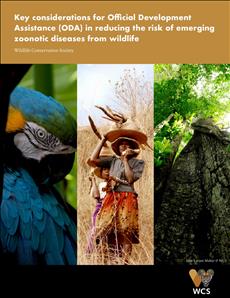Title
Key Considerations for Official Development Assistance (ODA) in Reducing the Risk of Emerging Zoonotic Diseases from Wildlife
Author(s)
Wildlife Conservation Society
Published
2020
Abstract
Since COVID-19 emerged in Wuhan, China in December 2019, it has infected millions of people across six of the world’s seven continents, and caused hundreds of thousands of deaths. The situation is dynamic and these numbers continue to increase. To reduce the spread of COVID-19, more than half of the world’s population has been locked down, disrupting the global economy on a massive scale. Although there is substantial uncertainty, the International Monetary Fund predicts global economic losses at $9 trillion for 2020-2021, and a decline in GDP in advanced economies of 6.1% The cause of this pandemic was the spillover of a virus (SARS-CoV-2) from wildlife to people, possibly at a wildlife trading market. Its global explosion has been enabled by unprecedented levels of human interconnectivity, mobility, and trade. The majority of emerging infectious disease threats are zoonotic (diseases that are transmitted between animals and people). By tracking the origins of 335 emerging infectious diseases between 1940 and 2004, Jones et al. found that 60% that were zoonotic, 72% of which originated in wildlife, including HIV/AIDs, Ebola, Hendra virus, Nipah Virus, Severe Acute Respiratory Syndrome (SARS), while 28% originated in domestic animals. There are an estimated 1.6 million unknown viruses in wildlife, of which roughly 700,000 are thought to have zoonotic potential. COVID-19 and SARS are both linked to bats and to wildlife trade for human consumption. The rapid transmission trajectories of both of these diseases demonstrate that human contact with wildlife (whether direct, i.e., handling or eating, or indirect, e.g., saliva, blood, feces or urine) can lead to potentially devastating consequences when a spillover spreads rapidly because of extraordinarily high levels of human and trade interconnectivity and mobility.
Keywords
COVID-19; zoonoses; Official Development Assistance (ODA); wildlife trade
Access Full Text

Back
DMX3861600000